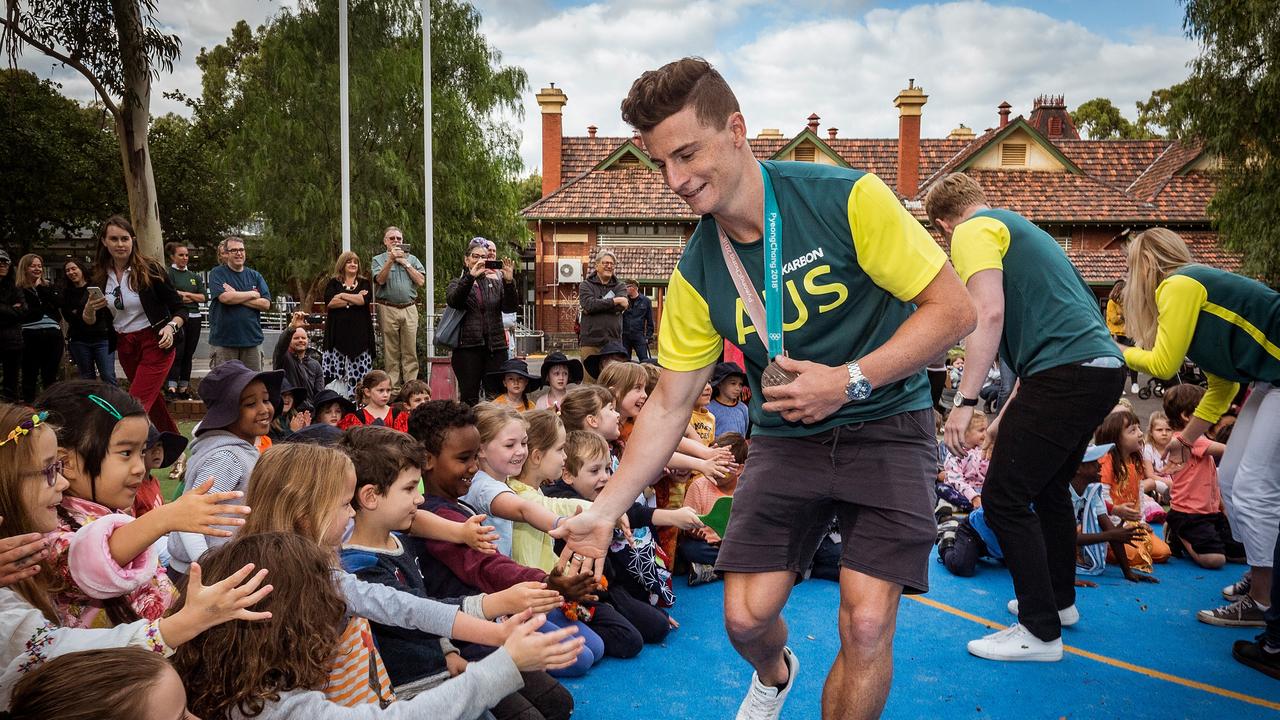Winter Olympics 2018: Elise Christie’s horror Olympics as cruel as French ice skater’s wardrobe malfunction, North Korean’s skate grab
Heard the one about the North Korean who tried to grab an opponent’s skate? No. Now you have.
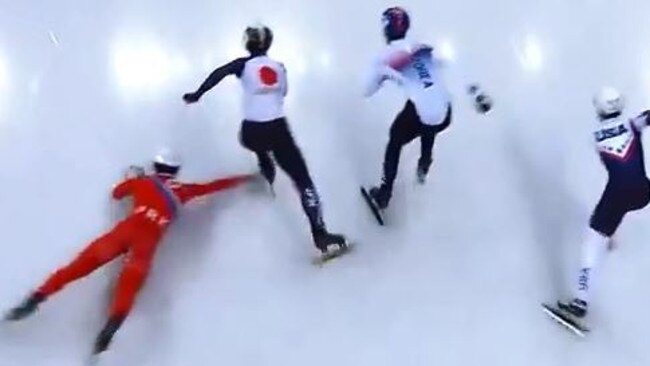
Welcome to live coverage of Day 11 of the 2018 Winter Olympics from PyeongChang. Short track speed skaters Deanna Lockett and Andy Jung are the Aussies in action today (9pm AEDT).
10.30pm: Cheat to win
It’s hard to tell whether Kim Jong-Un would be happy with this or not but it’s going to make headlines nonetheless... juslt likely not in the People’s Republic, where failure is not an option.
However in a truly novice display, 16-year-old North Korean speed skater Jong Kwang Bom faceplanted at the start of heat seven of the men’s 500m and then in a bid to get a restart tried to grab the skate of Japanese skater Keita Watanabe - it’s an ill-advised move, because sportsmanship... but also thiose skates are sharp.
Anyway he missed and then upon the restart the two tangled yet again on the first turn, as Jong decided to tangle arms with the Japanese. Getting his just desserts Jong fell and was later disqualified as Watanabe moved on to the quarter-finals.
Here’s the moment of madness in all its Olympic glory.
Grabbing a razor sharp ice skate...
— 7Olympics (@7olympics) February 20, 2018
Not the best idea #PRK Jong Kwang Bom!? 😬 pic.twitter.com/pkTUqKxiqG
9.48pm: Jung crashes and burns
Andy Jung’s Olympic short track hopes in the 500m were shattered when the Australian was brought down in his heat by American skater Aaron Tran.
Clipped by Tran, Jung tried to keep his balance but could not and went crashing into the wall along with French skater Thibaut Fauconnet, only to get up and finish the race as China’s Wu Dajing produced an Olympic record skate in a time of 40.264.
😢 🇦🇺 Andy Jung crashes out of the 500m short track #SpeedSkating heats. After judges' review he will not go through to the quarter-finals.#PyeongChang2018 pic.twitter.com/gDT18onLok
— 7Olympics (@7olympics) February 20, 2018
Judges later disqualified Tran but elected not to advance Jung as a result of the incident.
9.34pm: Christie’s Olympic horror show continues
Elise Christie - the British world short track champion has had an Olympic Games to forget and it only got worse in the women’s 1000m.
After blowing the 500m by crashing out in the final, Christie also crashed out in the 1500m semi-final with an injury to her ankle seeing her carried off the track.
Then disaster struck again in her 1000m heat.
At the beginning she clipped skates with Hungarian skater Andrea Keszler and fell, clutching at her ankle only to decide she was right to go at the restart.
However, she limped off the start line in what appeared to be a game display, but as she built up speed the Scot skated onto the back of the pack and made a couple of under-cutting moves to get herself into second place, which she held until the end but then after crossing the line in second she was disqualified for contact during the race, ending an Olympic Games campaign that started with much hope in complete disarray as she was once again carried from the ice.
High drama! #GBR Elise Christie finishes 2nd but is disqualified by the judges for interference and will not go through to the quarter-finals. #PyeongChang2018 pic.twitter.com/UObO6zspQ7
— 7Olympics (@7olympics) February 20, 2018
9.07pm: Deanna Lockett out of women’s 1000m speed skating
Australia’s Deanna Lockett has missed out on making the finals of the women’s 1000m short track.
🇦🇺 @Deannalockett was penalised for this... 🤔🤔
— 7Olympics (@7olympics) February 20, 2018
Your thoughts? pic.twitter.com/Hqg37iRrtp
The Australian made a move early to go to the front but when the speed went on slipped back before eventually being penalised for contact in a move with Kazakh athlete Anastassiya Krestova, ending her hopes in the process.
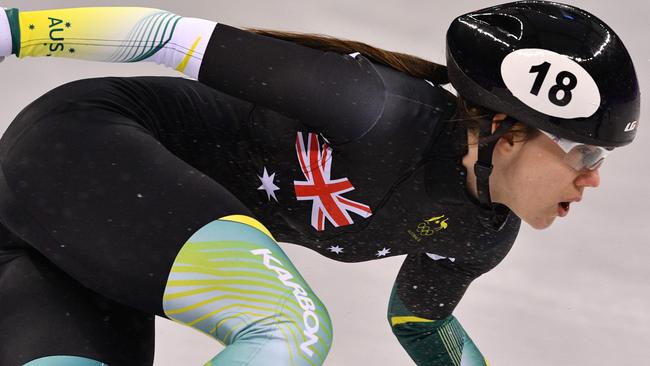
9.03pm: Norway claim OT win to make ice hockey quarters
Norway have made the final eight of the ice hockey at the Winter Games for the first time, with a 2-1 overtime win over Slovenia.
They have set up a clash with heavyweights Russia in which they will be the clear underdogs.
#NOR win an overtime thriller! They are through to the quarter-finals of #PyeongChang2018 pic.twitter.com/Ey1uXHgMwQ
— 7Olympics (@7olympics) February 20, 2018
8.25pm: Slovenian the third drug cheat busted at Games
A Slovenian ice hockey player at the Winter Olympics has failed a doping test and is suspended for the remainder of the Games, the Court for Arbitration for Sport (CAS) said on Tuesday.
Ziga Jeglic has tested positive for the prohibited substance fenoterol, used to treat asthma and bronchitis, in an in-competition test, CAS said. The CAS anti-doping division “acknowledges the voluntary suspension” of Jeglic, who turns 30 on Saturday.
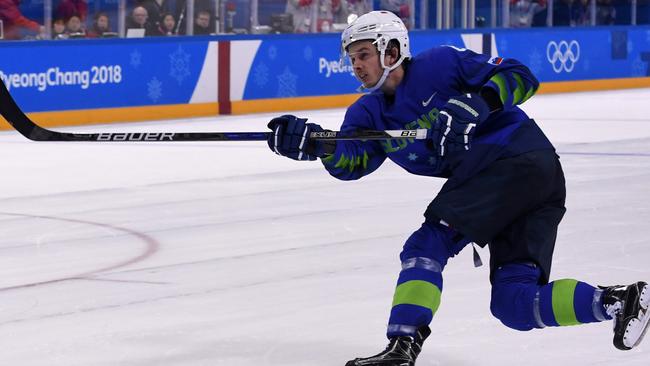
The player is “suspended from competing in the remainder of the Olympic Winter Games” and “will leave the Olympic Village within 24 hours.” Team Slovenia tweeted that the A-sample of the test was positive. It is the third case being dealt with by CAS at the Games.
7.45pm: Team USA march into ice hockey final 8
Ryan Donato and Ryan Zapolski got knocked down, but they got up again and led the American ice hockey team into the quarter-finals.
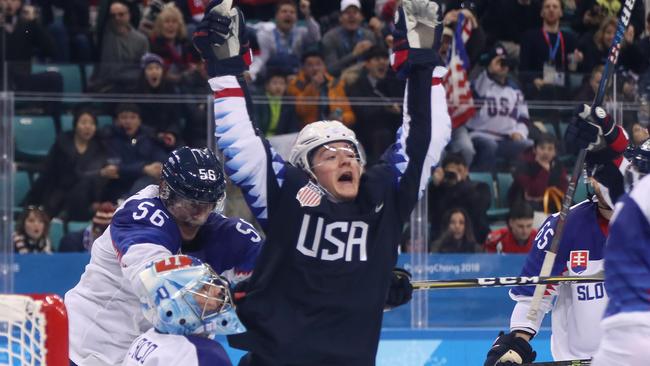
Donato and Zapolski took blows to the head, stayed in the game and were two of the biggest reasons the US beat Slovakia 5-1 in the qualification round to move on to face the Czech Republic on Wednesday. As they got to their feet, the ‘90s hit “Tubthumping” by Chumbawamba with its familiar chorus of “I get knocked down but I get up again” blared over the speakers, Donato scored two goals to tie his father, Ted, with four in a single Olympics and Zapolski stopped 21 shots in arguably his best game of the tournament while facing elimination for the first time.
Along with Donato, fellow college player Troy Terry showed he can thrive on the big stage with three assists in a breakout performance by a team that had scored only four goals in the previous three Olympic games.
“We all had to show up,” Zapolski said. “We know we have to win now to keep moving on. I think that’s something that shows how strong this team is and how resilient we are. We had I think our best game today.”
6.50pm: Kiwis in with men’s medal chances
New Zealand are still trying to end an Olympic medal drought that stretches all the way back to Albertville in 1992 when Annelise Coberger won silver in the women’s slalom.
Now in the men’s ski halfpipe final on Thursday they will have three of the 12 finalists as they look to end that drought.
Byron Wells and Beau James-Wells qualified fourth and fifth respectively behind American stars Aaron Blunck, Alex Ferreira and Torin-Yater-Wallace, while 16-year-old whizkid Nico Porteous also qualified to ski for a medal, by qualifying 11th.
Back seat chats with @duncancampbellnz @nicoporteous @miguelporteous and @finnbilous
— NZ Olympic Team (@nzolympics) February 9, 2018
Gotta love those baked beans! #bakedbeans #EarnTheFern 🌿#PyeongChang2018 🇰🇷 pic.twitter.com/Xq3xifLqkQ
5.30pm: Vonn to throw caution to the wind in downhill
Lindsey Vonn has great form on the Olympic downhill course and has been on fite this season, so it would only be fitting if she won the women’s downhill to bow out with a second Olympic gold but the 32-year-old star insists she is not thinking about it.
“I’ve tried not to think about it as being my last Olympic downhill. Just focus on the moment, the right here and the right now. And I think later I’ll reflect on how much I enjoyed it and how much my teammates and my coaches made it special for me,” Vonn said ahead of Wednesday’s contest.
“But you can’t get too sentimental right now, because I still have to race. I still have to be focused. And afterward, I’ll do some reflecting.”
What she also hopes to do, of course, is win a second gold medal in her sport’s fastest event, to go along with the one from the 2010 Vancouver Olympics.
Vonn missed the Sochi Games four years ago after tearing ligaments in her right knee and has said this will be her last go-round at an Olympics. She was asked this week how her health is at the moment.
“Everything’s great. I feel like a million bucks,” she said with a smile.
Vonn, generally considered the greatest female ski racer in history, was in strong form heading into these Olympics, winning the last three World Cup downhills she entered beforehand.
Most consider her the favourite, and she looked good in training runs. She produced the fastest time Sunday and the third fastest Monday despite easing up before the finish. In the final practice Tuesday, she was fourth fastest, trying different racing lines to see which created the most speed.
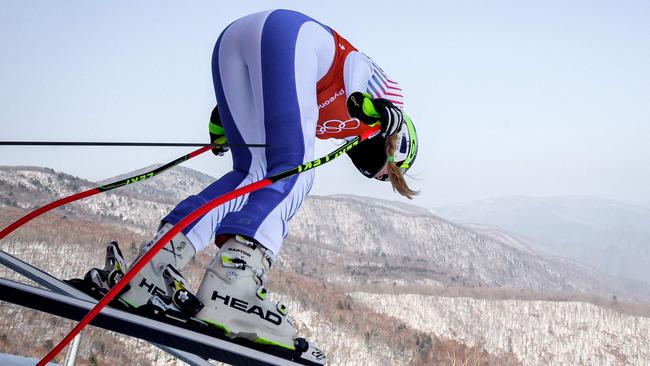
“Some of the lines I took (Tuesday) I think were faster, others not,” Vonn said course-side, before going to analyse her run on video. “Everything feels pretty good.”
Vonn promised an “all or nothing” effort.
“There’s really no need to be nervous or think about pressure or expectation,” she said. “If I’m nervous then I’m going to lose anyway, so what’s the point?”
4pm: Congested schedule
Mikaela Shiffrin is feeling relaxed by her decision not to race in the downhill and has produced a fast practice run to set her up for Thursday’s Alpine combined event.
The American acknowledged feeling “a little bit of relief” after the program changed late Monday.
Organisers brought forward the combined by one day to avoid forecast strong winds.
The demands of back-to-back race days meant Shiffrin opted out of Wednesday’s downhill to focus on combined, which includes a run of slalom, her specialist discipline.
Shiffrin posted the fifth-fastest time in Tuesday’s practice. She is among the favourites to add the combined Olympic title to the giant slalom she won last Thursday.
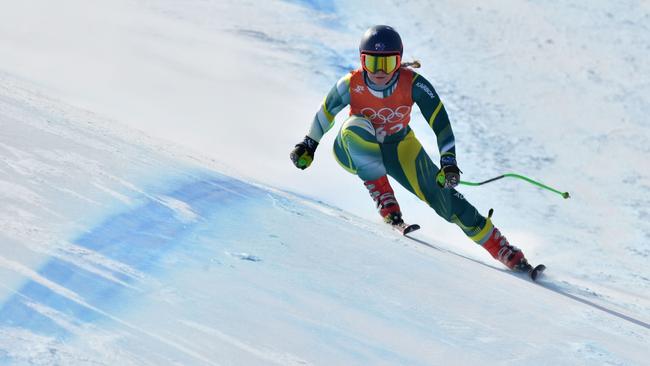
3.30pm: Canada pair win gold
Canadian figure skaters Tessa Virtue and Scott Moir have won the ice dance gold, edging out
Gabriella Papadakis and Guillaume Cizeron by less than a point.
Virtue and Moir, who led after the short dance, scored a total 206.07 points after today’s free dance in which they performed to the song Moulin Rouge. Papadakis and Cizeron scored 205.28, while US brother and sister pair Maia Shibutani and Alex Shibutani won bronze with 187.69.
It lends a serious note to the wardrobe malfunction that the French pair suffered in the short dance routine, which exposed Papadakis’s left breast live on television.
Just when she should have been focusing on a flawless exhibition, she was forced to worry more about keeping her glittering emerald costume on.
When the clasp became unhooked, the 22-year-old was more worried about holding up her outfit than making sure her twizzles and rhumba were in sync.
It’s unclear whether the judges docked the couple for the wardrobe issue. The rules state losing any part of a costume, even a hair clip, can lead to a one- point deduction.
“It’s a little bit frustrating to know that it’s not because of something that we did,” Cizeron said. “It’s just a costume issue, something as stupid as that, so it’s a little bit disappointing.” Papadakis was nearly in tears as she approached reporters after the routine, which is required of any Olympic competitor after competition. But she was in better spirits an hour later, when she no doubt realised that her chance of a gold medal was still intact.
“It was pretty distracting, kind of my worst nightmare happening at the Olympics,” Papadakis said. “I told myself, ‘I don’t have a choice. I have to keep going,’ and that’s what we did. I think we can be proud of ourselves being able to deliver a great performance with that happening.”
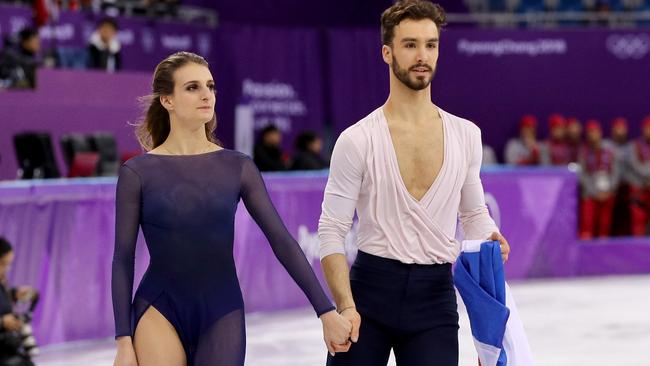
2.45pm: Rocks and rolling
Before all the shouting and the sweeping and the rolling of rocks at the Olympic curling venue can begin, that’s when Shawn Oleson gets to work.
An assistant ice technician for the US Curling Association, Oleson is in South Korea to help with the painstaking process of getting the sheets at the Gangneung Curling Centre ready for competition. One of his jobs is scraping off the old layer of pebbles - the tiny dots of ice that cause the stones to curl - so a fresh layer can be applied to the sliding surface.
And his goal, like the referees in a basketball game or the guy mowing the grass at the Masters: making sure no one is talking about him or his co-workers when the tournament is over.
“Nobody knows the greenskeeper at Augusta,” Oleson said. “But they love playing there.” Curling is the busiest sport at the Olympics, with 18 straight days of competition and as many as three sessions with four concurrent matches per day.
And between each game, the ice needs to be repaired and prepared with a new layer of pebbles, which reduce the friction on the 42-pound curling stones as they slide down the ice on the bending route that gives the sport its name. The pebbles allow the athletes to swing their stones around an opponent’s and into the scoring area called the house. If they’re not big or small enough, the rocks’ speed won’t be right; if they’re not evenly spread, players won’t be able to plan their shots using the strategy that makes curling more like chess on ice than just a frosty form of shuffleboard.
Like a golfer reading a green, curlers pick up tendencies in the ice and the stones. Some sheets curl more than others, or curl differently at each end; sheets also can change as the tournament goes on.
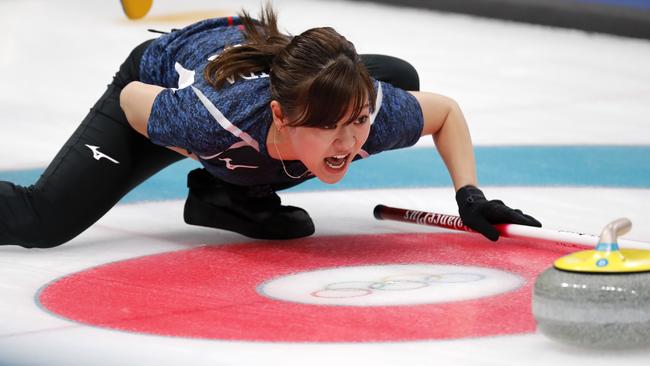
2.15pm: Mixed emotions
Cassie Sharpe stormed to Olympic gold despite falling on the final run after the result of the competition was already decided.
Favourite Sharpe, from Canada, produced some jaw-dropping aerobatics to post a winning score of 95.80 on her second run, celebrated by raising her hands behind her head to give a bunny-ear sign as she crossed the line backwards.
Frenchwoman Marie Martinod matched the silver she earned in Sochi four years ago with a best of 92.60, while Brita Sigourney claimed bronze a further point back after edging out fellow American Annalisa Drew.
Sochi gold medallist Maddie Bowman’s hopes of retaining her title were dashed when she suffered a nasty spill on her final run, the American needing medical attention before limping to the finish on one ski in tears.
A day to forget for the favourite.#Olympics pic.twitter.com/L06T4YcvO6
— 7Olympics (@7olympics) February 20, 2018
2pm: Piping hot
Canada’s Cassie Sharpe has claimed gold in the freestyle skiing halfpipe event. Here she is after the event.
The best in the world 🇨🇦🥇@CassieSharpe, who dominated qualies, backs it up in explosive style to win gold with a high score of 95.80.#Olympics pic.twitter.com/B7LeZJmbh8
— 7Olympics (@7olympics) February 20, 2018
1.30pm: Break, or break through
Many of the Alpine medallists here have dealt more than once with the rigorous process of recovering from long-term injuries. These ski racers have wrecked knees, broken assorted bones or banged-up their backs. They have been forced to sit out a full season — or longer. And they keep coming back for more.
Among them is Swiss ski racer Lara Gut. Tuesday is the one-year anniversary of surgery to repair her anterior cruciate ligament and meniscus. She’s thrilled to be back to race in the women’s downhill.
When it comes to other sports, fans often hear about athletes sidelined for days at a time. A strained muscle here. A sore shoulder there. Not in Alpine racing. Not by a long shot. Like Gut, these Olympians’ statuses are best described as month-to-month or even year-to-year, rather than week-to-week.
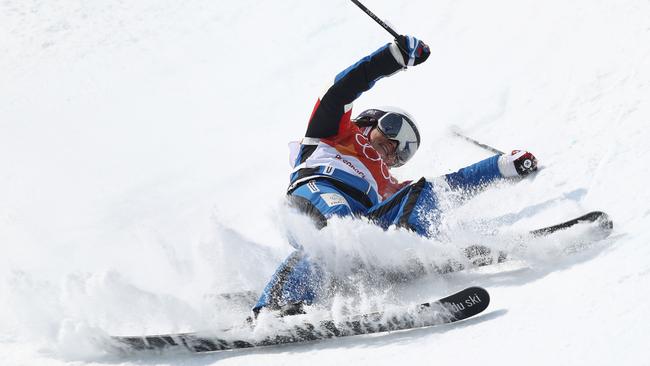
1pm: Vonn targets triumphant exit
Lindsey Vonn prefers not to dwell on what shapes up as a significant storyline for the women’s downhill at the PyeongChang Games.
“I’ve tried not to think about it as being my last Olympic downhill. Just focus on the moment, the right here and the right now. And I think later I’ll reflect on how much I enjoyed it and how much my teammates and my coaches made it special for me,” Vonn said ahead of Wednesday’s contest. “But you can’t get too sentimental right now, because I still have to race. I still have to be focused. And afterwards, I’ll do some reflecting.”
What she also hopes to do, of course, is win a second gold medal in her sport’s fastest event, to go along with the one from the 2010 Vancouver Olympics. Vonn missed the Sochi Games four years ago after tearing ligaments in her right knee and has said these will be her last go-round at an Olympics. Vonn, generally considered the greatest female ski racer in history, was in strong form heading into these Olympics, winning the last three World Cup downhills she entered beforehand.
Most consider her the favourite Wednesday, and she looked good in training runs, including producing the fastest time Sunday and the third-fastest Monday despite easing up and standing with arms spread wide before the finish. “I’m trying to just enjoy literally every second,” she said, “and enjoy being with my team.”
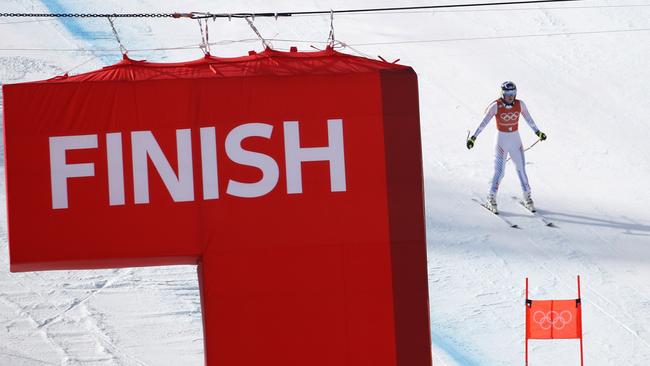
12pm: The halfpipe routine that wasn’t
The words left Liz Swaney’s lips without an ounce of irony. No telling curl of the lips. No wink. Nothing. She meant them. All of them.
“I didn’t qualify for finals so I’m really disappointed,” the 33-year-old Californian said after coming in last in the 24-woman field during Olympic women’s halfpipe qualifying.
She seemed ... surprised.
Even though her score of 31.40 was more than 40 points behind France’s Anais Caradeux, whose 72.80 marked the lowest of the 12 skiers to move on to today’s medal round.
Even though Swaney finished in about the same position in each of the dozen events she competed across the globe over the last four years in the run-up to the PyeongChang Games.
Even though her two qualifying runs at Phoenix Snow Park featured little more than Swaney riding up the halfpipe wall before turning around in the air and skiing to the other side. It was a sequence she repeated a handful of times before capping her final trip with a pair of “alley oops”, basically inward 180 degree turns more fitting for the local slopes than the world’s largest sporting event.
Halfpipe is judged on a 100-point scale. Swaney has yet to break 40 in an FIS- sanctioned competition, not because she regularly wipes out trying to throw difficult tricks but because she doesn’t even try them.
Yet she’s here in South Korea anyway as part of the Hungarian delegation, the latest in a series of quixotic pursuits that include running for governor of California as a 19-year-old student at Berkeley to trying out for the Oakland Raiders cheerleading team to mounting a push to reach the Olympics as skeleton racer for Venezuela. She only started skiing eight years ago and only got serious about it after the skeleton thing didn’t take.
“She would compete in [world cups] consistently over the last couple years and sometimes girls would crash so she would not end up dead last."
— 7Olympics (@7olympics) February 19, 2018
What a strategy from the Hungarian! pic.twitter.com/YtcKTOSoYh
Swaney did nothing illegal to get here. She racked up the required FIS points to reach the Olympic standard. She went through the necessary hoops to join Team Hungary, the connection coming from her Hungarian maternal grandfather, who she said would have turned 100 on Tuesday. She’s spent more than her fair share of money hopscotching continents chasing a dream she says was hatched watching the 1992 Games.
It was not easy and it was not cheap. Yet she kept at it. Keeping at it is kind of her thing. No matter how you try to frame the questions, the answers come back the same. She swears this isn’t a publicity stunt. This is real. “I’m trying to soak in the Olympic experience but also focusing on the halfpipe here and trying to go higher each time and getting more spins in,” said Swaney, who wore bib No. 23 and stars-and-stripes goggles not as some sort of statement but basically because they were the least expensive in the athlete’s store. One problem. Swaney doesn’t go very high. She doesn’t spin very much. Canadian Cassie Sharpe packed more twists into the first two tricks of her qualifying-topping run than Swaney did all day. In an event making its second Olympic appearance, one focused on progression and pushing the edge, Swaney’s tentative, decidedly grounded trips down the pipe play in stark contrast to everyone else.
The English language announcer stayed largely quiet during Swaney’s second run because, well, there wasn’t much to describe. As Lady Gaga blared over the speakers, the crowd watched in silence for sparse applause at the end. The judges awarded her for doing back-to-back “alley oops,” with the American judge even giving her a 33. It was better than her first, but it was nowhere near world class.
Swaney is here because she earned her way in. Still, it leads to the inevitable question: should she be?
11.30am: Desperate skiers head for a garage
When a group of Olympic skiers needed somewhere to train on snow in the middle of summer, they found it in an unexpected place — Read here
11am: A thriller on the ice
The Norwegian gold rush continues!
— 7Olympics (@7olympics) February 19, 2018
ICYMI: 🇳🇴 Havard Lorentzen set a new Olympic Record on the way to winning 🥇 in a thrilling 500m #speedskating final. #PyeongChang2018 pic.twitter.com/BwKKpvHmPT
10.30am: Olympics legend passes away
Olympic hammer record-holder Sergei Litvinov has died at the age of 60, Russia’s athletics federation has reported.
The 1988 Olympic champion died suddenly in Sochi, where he had been coaching. “It was an unexpected death as Litvinov, who cycled home after the practice, suddenly fell down,” said a statement on the federation’s official website.
“The ambulance that came at once to the scene of the accident failed to save his life.” Litvinov, who also won silver at the 1980 Moscow Olympics and was a twice world champion, set the Olympic record of 84.80m at the Seoul Games when he won gold.
Following his sporting retirement, Litvinov worked as a coach guiding his son Sergei Litvinov junior to bronze at the European championships in 2014.
#NOR leads the #PyeongChang2018 medal tally with 11 golds.
— 7Olympics (@7olympics) February 19, 2018
An incredible (and slightly awkward) statistic: They've got a smaller population than Victoria. 😬😲 pic.twitter.com/QqC1iZE6xt
10am: Gold rush in the bobsleigh
Canada and Germany shared gold in a “crazy” climax to the two-man bobsleigh after they finished in a remarkable dead heat.
It is the first time since Nagano 1998, and only the second time in Games history, that has happened -- the first time also involved Canada.
The Canadian vintage of 2018, led by Hawaiian-born Justin Kripps, went in the final run to snatch a place alongside the Francesco Friedrich-piloted German duo at the top of the podium.
Bronze went to Latvia just 0.05sec behind in the high-octane event in which competitors whizz around the icy track at speeds of up to 150km/h.
After the Canadians surged to the finish line in the last run in the fourth and final heat, the waiting Germans raced onto the track to congratulate their rivals as all four men celebrated wildly and hugged one another.
Kripps’s brakeman Alexander Kopacz later admitted that the Canadian duo did not immediately know that they had shared gold.
“We just thought we had won outright. You see a number one on the time and it doesn’t really tell you that you’ve tied so Justin realised sooner than I did that we had tied for first,” said a disbelieving Kopacz.
“It took me a couple of minutes, we were in the changing room and I said that I wasn’t sure what just happened.
“It does not take anything away, we are all extremely happy and it’s such an honour to tie with such a strong team.”
The medal places were fiercely contested throughout, with a mere 0.13secs splitting five teams -- three of them German -- going into the last heat.
Double the excitement. Double the #gold.
— 7Olympics (@7olympics) February 19, 2018
ICYMI: #Ger and #Can couldn't be separated in the 2-man #bobsleigh. 🥇🥇 pic.twitter.com/Nj5i7IH2cG
9.30am: Mighty mo leaps to gold
Robert Johansson and his magnificent moustache anchored Norway to a stunning Olympic ski jumping gold in the men’s team event to deny Poland’s Kamil Stoch a PyeongChang double.
The 27-year-old, who has lit up social media with his bushy ginger whiskers and picked up two individual bronze medals in Korea, produced a final jump of 136m to edge Germany into silver and leave large hill champion Stoch with a team bronze.
“We’ve been a bit nervous today,” said Johansson, his bristly moustache quivering in the chill night air. “I think it’s fantastic to perform like we did,” he added, after leading Norway to their first Olympic team gold.
Norway finished with a winning total of 1,098.5 points to Germany’s 1,075.7 to snatch top spot in the Olympic gold medal table with 11, one more than the second-placed Germans.
Andre Daniel Tande set the tone for Norway by unleashing a monster jump of 140.5m before Andreas Stjernen’s effort of 135.5 put their rivals under serious pressure.
Germany’s normal hill gold medallist Andreas Wellinger pulled out a leap of 134.5m, which was good enough to earn him a second silver of the Games after finishing behind Stoch in the large hill at the weekend.
Stoch, who did the normal and large hill double in Sochi four years ago, had it all to do on his final jump, but came up short as Poland’s men in chocolate brown suits finished third with a total of 1,072.4 points.
“It’s still a historic moment for us because it’s the first medal for Poland in (team) ski jumping,” said Stoch, who tied fellow ski jumper Adam Malysz on a Polish record four Olympic Winter Games medals.
“We did everything that we could. It’s a little bit (of a) pity because we were so close to the silver but we’re happy.” Germany, meanwhile, won their sixth Olympic ski jumping team medal, a joint record with Austria.
“After the first round we were close to the gold medal but the Norwegian guys were really, really strong today and also the last weeks,” said Germany’s Karl Geiger.
Spectacular!#Gold to #NOR in the men's #SkiJumping team final. #PyeongChang2018 pic.twitter.com/vzgkXoi6Co
— 7Olympics (@7olympics) February 19, 2018
9am: US, Canada showdown
The US will play for a gold medal in women’s ice hockey for the third-straight Winter Olympics.
Four-time defending champion Canada will be waiting for them. The Americans had a 5-0 victory over Finland in the semi-finals, a score that Canada matched against the Olympic Athletes from Russia (OAR) late on Monday night to set up the gold medal showdown between the premier powers.
“It’s honestly a dream come true,” US forward Hilary Knight said. “This is the world’s biggest stage. This is the game that you want. “This is the game we’ve been dreaming of and to have another opportunity to get back here, it’s huge.” Dani Cameranesi scored two goals and added an assist to push the Americans to their big win over Finland.
The 22-year-old Cameranesi is playing in her first Olympics. Knight is one of six Americans who will get a third opportunity to win the gold - something they have not done since 1998.
The others are captain Meghan Duggan, Gigi Marvin, Kacey Bellamy and twin sisters Monique Lamoureux-Morando and Jocelyne Lamoureux-Davidson. “We worked four years to put ourselves in position to compete for a gold medal and we’ll enjoy this for a little bit, but we know that this isn’t what we came here for. We’re ready to go to battle in a couple days,” Lamoureux-Davidson said.
Jennifer Wakefield scored twice for Canada and Shannon Szabados stopped 14 shots in their lopsided semi-final win.
Finland and the OAR team play off for bronze.
#CAN flex their muscles in the #icehockey 🤘
— 7Olympics (@7olympics) February 19, 2018
It ends #CAN 5-0 #OAR#icehockey #Pyeonchang2018 pic.twitter.com/RpuRyCa07n
8.30am: Skater’s ‘worst nightmare’
The designer of the dress worn by French ice skater Gabriella Papadakis in the Winter Olympics says she feels “terribly guilty” after an unfortunate wardrobe malfunction caused the outfit to slip.
Papadakis, who with Guillaume Cizeron is among the favourites for gold in the ice dance event, said she had suffered her “worst nightmare” after Cizeron inadvertently unclipped the back of her green costume during their short dance routine.
Her halter-top slipped sideways to briefly expose her left breast, but the French pair showed remarkable composure to skate on and finish the first day of competition in the silver medal position behind Canada’s Tessa Virtue and Scott Moir.
Designer Sophie Thomas, who has made all the pair’s outfits for the past six years, told AFP: “I feel terribly guilty, even though it’s not my fault.
“I just can’t explain it, it’s a real mystery. The top was firmly attached. “There were studs on the top and a hook which held up the back of it. And there was stitching over the top of it.
“We just don’t know why it came undone at that very moment. It’s bad luck, there’s just no rational explanation.”
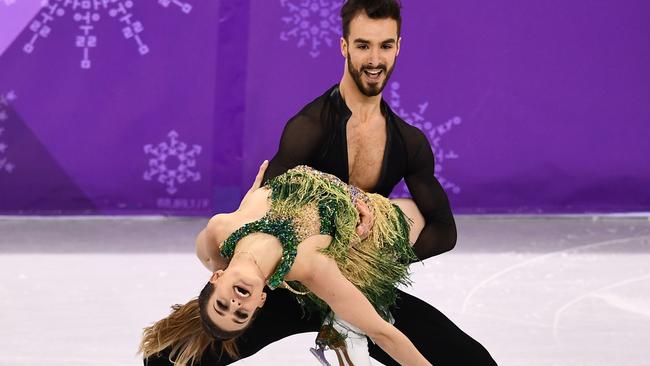
A tearful Papadakis called it her “worst nightmare”.
The mishap happened when the 22-year-old Papadakis leaned backwards early on and Cizeron inadvertently unclipped the back of her green costume.
Her halter-top, complete with tassels and spangles, edged sideways to briefly expose her left breast.
The duo were still able to finish their short dance as Papadakis tried to keep her chest covered, but she left the ice in tears.
Compounding her embarrassment, the incident was replayed in slow motion on screens at the arena.
“It was pretty distracting, my worst nightmare at the Olympics,” Papadakis said after drying her eyes. I felt it right away and I prayed.
“I told myself ‘you have to keep going’ and that’s what we did and we have to be proud of ourselves, delivering a great performance with that happening.” Cizeron added: “It’s just frustrating to miss a few points because of a costume issue. It is not what we get ready for when we train.” The Vancouver 2010 champions Virtue and Moir posted a short-dance world record score of 83.67 points to take a lead of 1.74 into Tuesday’s free dance.
Papadakis is not the first figure skater to have a wardrobe fail at these Games. South Korean Min Yura won the hearts of skate fans on her Olympic debut after bravely battling on after a hook popped on her dress just seconds into her routine in the team short dance.
Focusing on executing her spins with partner Alexander Gamelin, Min had to keep adjusting her red top, winning rich praise from commentators for keeping her cool.
8am: Day 11 — Aussies to watch
SHORT TRACK SPEED SKATING
* 9.03pm: Deanna Lockett (women’s 1000m heat 2)
* 9.45pm: Andy Jung (men’s 500m heat 1)
-
MAKING NEWS
• Russian athletes may be stripped of the right to walk behind the Russian flag at the after one of their medal-winning teammates failed a drug test.
• Australia’s Jess Rich defied doctors orders and serious injury to compete in the big air event.
• Judges involved in the controversial decision that sent David Morris out of the aerials final have defended the scoring system.
• The bad blood between Alex ‘Chumpy’ Pullin and teammate Jarryd Hughes has continued days after the latter won a silver medal in the snowboard cross.


